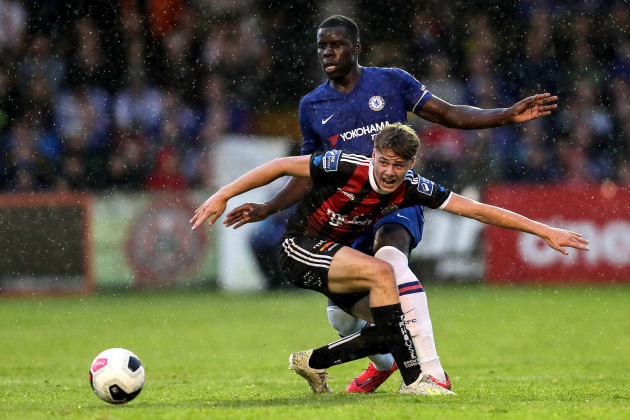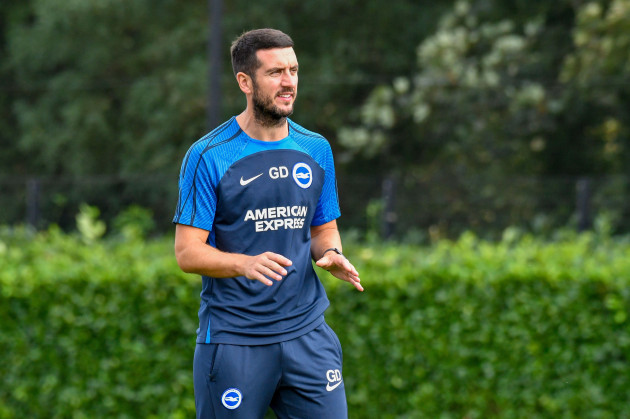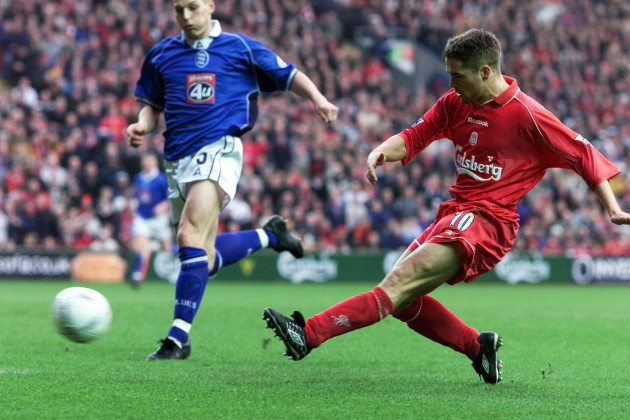2023 WILL BE remembered as Evan Ferguson’s breakout year, and most months brought a new emblem of remarkable progress.
In January he became the youngest player to score in consecutive Premier League appearances and the second-youngest to score and assist in the same match, after Michael Owen.
In March he became the youngest player to score on his first international start for Ireland since Kevin O’Flanagan did so in 1937.
By the end of last season, his minutes per goal or assist ratio in the Premier League was bettered only by Erling Haaland and Mo Salah.
In September he became the fourth player to score a Premier League hat-trick aged 18 or under, and then followed Cesc Fabregas as the only non-English player to register 10 Premier League goal involvements while aged 18 or under.
And in October he became the first teenager to score at least 10 Premier League in a calendar year since Wayne Rooney did it in 2005.
In terms of a teenager’s rookie year impact on the Premier League, Ferguson has no contemporary rivals. The only true measurement is against those who have come before him: Rooney, Fabregas, Fowler, Owen.
“He has obviously had a great impact on the Premier League in his short time so far”, Owen tells The 42. “He is the perfect modern-day striker, in terms of his size, his presence, and his speed.
“Long gone are the days when you have little and large and different combinations of strikers. At the moment the game tends to have one striker playing alone up front, who has to do a bit of everything. He is the perfect size and shape to do that.”
Ferguson’s stunning breakthrough owes much to his talent and attitude, but it’s also proof he picked the right club. Former Irish U21 international Gary Dicker is assistant manager with Brighton’s U21s and talks us through how the club’s academy polishes the gems that arrive to their door.
“Evan developed quite early”, says Dicker. “Usually when that happens, you stop developing in other areas and people catch up. He never did. It’s hard being the ones developing quick, and having to stay on top of it but he always kept his nose out in front.”
Every single player in Brighton’s academy is given an Individual Development Programme (IDP), where the player works with coaches and the different departments across the club – strength and conditioning, nutrition, sports science, medical, video analysis etc – to develop each individual part of their game.
First, the player’s game is broken down to its many constituent parts – eg physicality, heading, long passing, short passing, scanning, one v one attacking, pressing – and all of these parts are tested and scored on a sliding scale of one to seven, the latter representing a world-class standard. The player scores himself across all of these tests, as does the academy. From there, the academy revisits the IDP every six to eight weeks, working with the player to identify areas of his game the player wants to improve. Training is then tailored and separate IDP sessions are organised to improve the targeted skill.
These latter sessions can involve other, complementary targets – for example if a forward wants to improve their one-on-one attacking, and a defender wants to work on their one-on-one defending, they will be paired together for a session – but the IDP sessions rarely exceed more than four players at a time.
“Evan had that the whole way through”, says Dicker. “It is reviewed every few weeks. It can be with the analyst: Evan could have said, ‘I want to see Danny Welbeck’s clips’ or ‘I want to see Haaland’s doing’, and the analyst will provide him with the clips and talk him through them.
“He might want to get quicker on the gym or quicker on the grass, so his gym programme will be aligned to that. He might have wanted to bulk up a little bit, like Andy [Moran] did: his gym programme was quite intense. It’s very individual-based until the U21s, when you begin to do a lot more of the team stuff and the tactical stuff that comes with the coaching. But you can give everyone everything, it’s up to them to do it.”
A player’s IDP is passed along to the relevant coaching team as he rises through the academy, to the point Roberto de Zerbi’s first-team staff also have it to hand.
With every training session and match filmed, Brighton have a wealth of video evidence to draw on to help with these IDP sessions. “They are very interested in all of it, so they’ll come and say, ‘I want to do my clips’,” says Dicker.
“It is player-led. Previously, you probably would have had a manager saying, ‘You need to get tighter there’, or ‘You need to play forward there’, not really giving you a solution, or giving a clip and practising exactly what you need to do. In the academy, you have time to do that. I am not worrying about keeping my job and having to win every week.”
Former Tottenham midfielder Sandro played under de Zerbi at Benevento and did some work at Brighton’s academy as part of his coaching badges, working with Ferguson on his IDP.
They identified that Ferguson, when dropping off, occasionally did not play his pass forward often enough. He and Sandro worked on body shape when receiving the ball, reviewing clips and running through drills. It’s a vital skill to develop to play up front in de Zerbi’s Brighton team, where the central striker drops deep to take possession and feed wide players like Karou Mitoma and Simon Adingra, who are pushed further on.
“It’s not easy,” explains Dicker of Brighton’s style. “You might have to drop back as one of two tens and a few seconds later we’re attacking the back line with our wide players and you’ve got to be in the middle of the goal for a tap-in. It’s pretty complex, but it’s an unbelievable way of playing.”
As Dicker explains, the learning never stops. Part of that education simply comes from playing the game at the highest level, which compensates for the fact there is very little time to work on the training ground when there’s two games a week for which players have to prepare and recover.
“The really good thing for him is experience of scenarios”, says Dicker. “Experience of seeing pictures on the pitch: the more times you see it, the more you know how to find the solution. ‘I’ve seen this, I know he is going to try and go early’ or ‘I know he is going to pin me’ or ‘I know he will try to get tight to me’. The game itself is an unbelievable learning tool.”
As is working with de Zerbi, whom Pep Guardiola has called one of the most influential managers in the last 20 years.
“How we play is unique, it’s quite complex”, says Dicker. “It’s actually really difficult. It’s not easy even for a senior player to come in and understand the different roles, the timings as to when to be in space, understanding where you need to be if X player is inside and he is outside; the timing and the weight of pass: it’s not easy to do. It’s the hardest way to play, probably. He is learning so much from being in the team and with the manager here. It will only stand him in good stead.”
Brighton are also managing Ferguson’s minutes. Ferguson played a total of 1,335 Premier League minutes before he turned 19, whereas Owen clocked 4,554 minutes of league action for Liverpool before his 19th birthday.
Owen demurs when I ask him if he feels that workload contributed to the injuries that diminished his powers later in his career, but says Ferguson will benefit from Brighton’s judicious use of him.
“He may not feel that at the moment as he wants to play every minute of every game,” says Owen. “The manager taking his time with him is probably building up a real hunger from him to start in every game.”
Dicker agrees with the club’s policy. “They manage Evan really well,” he says. “Evan would play for the 18s and 21s if you let him, but with the pressures and intensity, I think they have managed it really well.” To illustrate that fact: a couple of days before I spoke with Dicker, Ferguson snuck into an U21 team meeting before a game with MK Dons, seeing if he could play.
Brighton run academy workshops to help players deal with the off-field realities of becoming top-level football, but Dicker admits it’s a difficult world for which to prepare anybody.
“Off the pitch is probably the biggest challenge,” says Owen. “When you step over the white line, that’s your office and your day-to-day, but when people start treating you differently and talking to you differently; when people are singing your name and taking your photo and asking for autographs, nobody is born to do that. That’s the side of things you have to learn: that is what can knock you off your stride.
“You’ve got to realise this is not the norm, it might last 15 years you receive adulation and fame and all the rest of it, but you’re still a brother, you’re still a son, you have to live another 60 years as a normal citizen, so don’t get carried away, it only lasts a few years.”
Dicker picks up on the same theme.
“We can talk about the coaches and the IDPs, but it all comes from your family background and your grounding”, he says. “The ones I’ve seen come through are the ones who are can be themselves, and the support they have from their families is a credit to them. It’s a tough job being the parent of a kid in any academy, with the ups and downs.
“I have two girls myself, they enjoy playing football and it’s the same: you have to remember they are your kids first. Players have coaches and everyone telling them everything, what they should or shouldn’t be doing. They have friends and social media, everyone telling them everything, and that family support and that understanding of knowing what comes with it, and how difficult it can be [is important.] But it’s to show support and allow the player to be themselves, and trusting in your own family values.
“Evan is the same lad who walked through the doors at 16. He has the same level of respect, he will speak to everyone at the club, which goes a long way. He is just one of the lads. That’s probably one of his greatest achievement. It sounds so basic, but it sums him up.”
Michael Owen was speaking in his capacity as a BoyleSports ambassador. BoyleSports offer the latest Premier League betting odds




